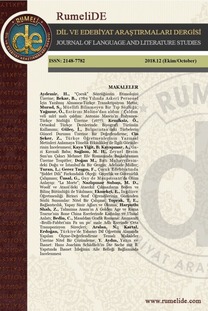15-Öğrenci yapısı podcast (ses yayını) oluşturma süreçlerinin yabancı dil olarak Türkçe öğrenenlerin konuşma ve yazma becerisi ile bu becerilerdeki öz yeterliliklerine etkisi
The impact of student - generated podcast formation processes on speaking and writing skills of learners of Turkish as a foreign language and their self-efficacy in these skills
___
- Antalyalı, Ö. L. (2006). Kümeleme analizi (cluster analysis). İçinde Ş. Kalaycı (Ed.), spss uygulamalı çok değişkenli istatistik teknikleri (ss. 349-376). Asil Yayın Dağıtım.
- Berk, R. R. (2019). Yabancı dil olarak Türkçe ö ğretiminde elektronik dinletilerin dinlediğini anlama başarısı ve dinleme kaygısına etkisi [Doktora tezi]. Gazi Üniversitesi Eğitim Bilimleri Enstitüsü.
- Büyükikiz, K. K. (2012). Türkçeyi ikinci dil olarak öğrenen yabancılar için yazma becerisi öz yeterlilik ölçeğinin geliştirilmesi: geçerlilik ve güvenilirlik çalışması. Mustafa Kemal Üniversitesi Sosyal Bilimler Enstitüsü Dergisi, 9(12), 69-80.
- Büyüköztürk, Ş. (2008). Sosyal bilimler için veri analizi el kitabı. Pegem A Yayıncılık.
- Ceyhan, C., & Karakaş, R. (2019). Yabancılara Türkçe ö ğretiminde kullanılacak yapılandırılmış bir podcastte bulunması gereken özellikler. Karadeniz Uluslararası Bilimsel Dergi, 44, 335-349.
- Farangi, M. R., Nejadghanbar, H., Askary, F., & Ghorbani, A. (2016). The effects of podcasting on efl upper-ıntermediate learners’ speaking skills. CALL-E, 76(2), 1-18.
- Foulger, T. S., Grazıano, K. J., Schmıdt-Crawfor, D. A., & Slykhuıs, D. A. (2017). Teacher educator technology competencies. Jl. of Technology and Teacher Education, 25(4), 413-448.
- Framework for 21st Century Lear ning. (2019). BattelleforKids. http://static.battelleforkids.org/documents/p21/P21_Framework_Brief.pdf
- Koçak, A. (2017). Developing speaking skills via creating and using learner podcasts in English language classes [Doktora tezi]. Hacettepe Üniversitesi, Eğitim Bilimleri Enstitüsü.
- Kooten, J. van, & Bie, T. de. (t.y.). How to make an educational podcast? Tips and tricks for your first educational podcast version 2.0. Leiden University Centre for Innovation. Geliş tarihi 06 Temmuz 2020, gönderen https://www.centre4innovation.org/
- New London Group. (1996). A pedagogy of multiliteracies: designing social futures. İçinde B. Cope & M. Kalantis (Ed.), Multiliteracies: Literacy learning and the design of soci al futures (ss. 10-30). Macmillan.
- OECD. (2008). 21st Century Skills: How can you prepare students for the new global economy. OECD. oecd.org/site/educeri21st/40756908.pdf
- Rosell-Aguilar, F. (2013). Podcasting for language learning through İtunes u: the learner’s view. Language Learning & Technology, 17(3), 74-93.
- Sallabaş, M. E. (2013). Türkçeyi yabancı dil olarak öğrenenler için konuşma öz yeterlik ölçeği: geçerlilik ve güvenirlilik çalışması. Dumlupınar Üniversitesi Sosyal Bilimler Dergisi, 36, 261-270.
- Stockwell, G. (2010). Using mobile phones for vocabulary activities: examining the effect of the platform. Language Learning & Technology, 14(2), 95-110.
- Şendağ, S., Gedik, N., Caner, M., & Toker, S. (2017). Mobil-yoğun-podcast dinlemenin İngilizce öğretmen adaylarının dinleme, konuşma ve eleştirel düşünme becerilerine etkisi. Eğitim Teknolojisi Kuram ve Uygulama, 7(2), 94-122.
- Toker, T., Akgün, E., Cömert, Z., & Edip, S. (2021). Eğitimciler için dijital yeterlilik ölçeği: uyarlama, geçerlik ve güvenirlik çalışması. Millî Eğitim, 50(230), 301-328.
- Türkiye yeterlilikler çerçevesinin uygulanmasına ilişkin usul ve esaslar hakkında yönetmelik, 2015/8213 (2015). www.myk.gov.tr/TYC
- ISSN: 2148-7782
- Yayın Aralığı: 6
- Başlangıç: 2014
- Yayıncı: Yakup YILMAZ
“Bir şehri bir mevsime dönüştürmek”: İklim Felaketine Üç Şiirsel Müdahale
41-Usûlî'nin şiirlerinde sevgili portresi
Menkıbelerde bir af dilenme makamı olarak eşik
3-Temel dil becerileri bağlamında Türkçe eğitiminin sahadaki sorunları ve çözüm önerileri
2-Görsel bir kodlama sistemi olarak grafik simge kavramı
Kemalettin DENİZ, İsmail Yavuz ÖZTÜRK
Jonathan BROUTIN, Dilek SOYLU BAŞTUĞ
Oyundan Öyküye: A Jury of Her Peers'ın Yazar ve Okurları
21-‘Yeni normal’ ve dilde yenilikler
4-Türkçe Sözlük’te at- fiiliyle kurulan anlamca kaynaşmış ve deyimleşmiş birleşik fiiller
